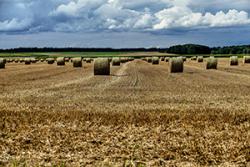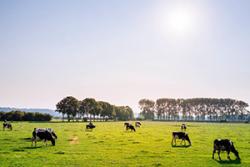Research to further increase resilience and sustainability of the UK food system
������ϲʹ������� is to receive and manage a portion of the UK’s programme- funding of £4.9 million for interdisciplinary research to increase the resilience and sustainability of the UK food system.
Over 1.5 million has been awarded to ������ϲʹ�������’s School of Environment, Natural Resources and Geography. Under the lead of Professor Paul Withers, a world-leading interdisciplinary team of biophysical and socio-economic scientists, together with a wide range of UK stakeholders, will investigate how to make the best sustainable use of phosphorus, a finite global resource, in the UK food system.
 Phosphorus is a vital ingredient for the production of healthy and profitable crops and livestock, but at the same time it is a major cause of pollution in freshwater lakes, rivers and the coastal zone. The efficiency with which phosphorus is used in agriculture is very poor and pollution arises due to leakage and waste at all stages of the food chain from production to consumption. To make matters worse, the UK has no natural sources of phosphorus, and relies on imported phosphorus, indirectly in the form of fertilizer and animal feed. Most of the world’s non-renewable phosphate reserves are controlled by very few countries, including Morocco, China, Syria and Algeria.
Phosphorus is a vital ingredient for the production of healthy and profitable crops and livestock, but at the same time it is a major cause of pollution in freshwater lakes, rivers and the coastal zone. The efficiency with which phosphorus is used in agriculture is very poor and pollution arises due to leakage and waste at all stages of the food chain from production to consumption. To make matters worse, the UK has no natural sources of phosphorus, and relies on imported phosphorus, indirectly in the form of fertilizer and animal feed. Most of the world’s non-renewable phosphate reserves are controlled by very few countries, including Morocco, China, Syria and Algeria.
This makes the UK highly vulnerable to fluctuations in the price and availability of this vital agricultural raw material, threatening our future food security.
An obvious solution is to make better use of the phosphorus that reaches this country, and to recycle as much of it as possible. This is the basic principle behind the circular economy that is now driving global phosphorus sustainability. However, this seemingly simplistic solution is highly complex in practice, because we do not understand well how our landscapes retain phosphorus inputs and how we can manage them to deliver a profitable agriculture whilst protecting our water resources and providing overall societal well-being. In addition, we need a better understanding of what will encourage stakeholders to make the transition to sustainable phosphorus management.
Delivering a framework for a transformation to sustainable phosphorus use therefore requires a combination of skills and expertise. Taking part are experts in global phosphorus sustainability science, food system vulnerability, catchment science, environmental engineering, adaptive capacity and economic modelling from ������ϲʹ�������, The UK’s Centre for Ecology and Hydrology, the Agri-Food and Bioscience Institute, Leeds University and the University of Technology, Sydney, Australia.
The aim is to use less phosphorus on the land, use it more efficiently and reduce leakage into UK waters - reducing the need to import an expensive and critical natural resource and reducing the negative effects of phosphorus on our environment
“This is an exciting project because it is the first time that a comprehensive attempt has been made to evaluate the current vulnerability of the UK’s food systems to potential phosphorus shortages, or to develop and implement a strategy to increase their sustainability,” explained Prof Paul Withers.
 “The end result of the three-year project will place the UK in a much better position to face an expected phosphorus supply constraints and price fluctuations, and to enable the sustainable intensification of UK agriculture to meet an expected rise in demand for food supplies. Better management of phosphorus in agriculture and related industries, and also in waste treatment, would also improve our waterways, and support the wildlife in those environments.”
“The end result of the three-year project will place the UK in a much better position to face an expected phosphorus supply constraints and price fluctuations, and to enable the sustainable intensification of UK agriculture to meet an expected rise in demand for food supplies. Better management of phosphorus in agriculture and related industries, and also in waste treatment, would also improve our waterways, and support the wildlife in those environments.”
Announcing the Awards, Science Minister, Jo Johnson, said:
“The Global Food Security programme is an excellent example of interdisciplinary research, bringing together a range of expertise across the biological, environmental and social sciences to address the many uncertainties facing the UK’s food system.
“Research is a vital part of our Industrial Strategy, and by increasing funding in this area we are helping ensure the future security of the UK food sector, while reinforcing our position as a world leader in science and innovation.”
Director of the Global Food Security programme, Riaz Bhunnoo, added: “This research showcases the vital role of the Global Food Security programme, and follows directly from our horizon-scanning, engagement with policy and business and our interdisciplinary food systems approach to the challenges. The research programme as a whole will help ensure the UK food system is resilient in a rapidly changing world.”
The research programme was driven forward by the UK’s Global Food Security programme, with funding from the Biotechnology and Biological Sciences Research Council (BBSRC), Economic and Social Research Council (ESRC), Natural Environment Research Council (NERC) and Scottish government.
Publication date: 25 October 2017
